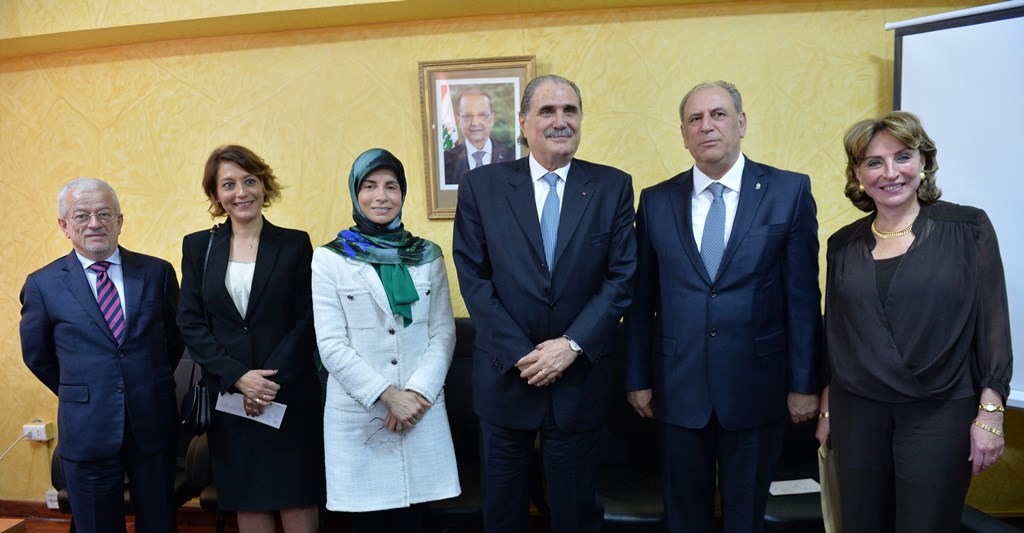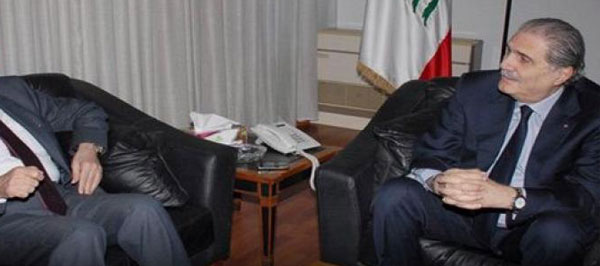COURTS > Public Prosecution Back
The functions of public prosecution are handled by judges who take in charge the representation of the social committee in instituting the public case and use it instead of the society.
The authorities of the public prosecution are limited to the pursuit and prosecution without any right to render judgments in penal cases.
Cassation Public Prosecution
Formation
Missions
Appeal Public Prosecution
Formation
The authorities of the public prosecution are limited to the pursuit and prosecution without any right to render judgments in penal cases.
Cassation Public Prosecution
Formation
- The public prosecution is chaired in the court of cassation by a prosecutor assisted by a number of public attorneys. He proceeds to distribute the activities falling within his competence among the public attorneys who assist him.
- The cassation prosecutor is appointed by virtue of a decree issued by the Cabinet upon the suggestion of the Minister of Justice.
- None prosecutor should be appointed before the court of cassation unless being a judge of the fourteenth grade and above. As to the Cassation Prosecutor, he should be a judge of eighth grade and above.
Missions
- The authorities of the cassation prosecutor comprehend all the judges of the public prosecution, including the commissioner before the military court. And he is entitled to address necessary instructions to each of them, being verbal or written, for the procession of the case of public right, but they reserve the discretion to talk in the trial sessions.
- He refers to each of them, according to his competence, the reports and minutes delivered to him concerning a certain crime, and asks them to set in motion the lawsuit of public right.
- He has the right to watch over the employees of the judicial police in the field of works they undertake in their capacity of assistants of the public prosecution. He is entitled as well to address to their superiors the remarks he deems necessary concerning these works, and to ask the appeal or financial prosecutor or the commissioner before the military court to take legal proceedings against whoever committed a penal crime during the accomplishment of his functions or in doing so without any notice of pursuit. The judicial judiciary will be the competent authority to examine such crime in spite of any contradictory text.
- The Ministry of Justice is entitled to ask him to initiate any follow up related to any crime he has knowledge of.
- He has the right to investigate directly or through his assistants, where needed, in all crimes. However, he is not specialized to directly take legal proceedings in their concern but he shall refer them to the competent prosecutor to set the public case therein in motion.
- The appeal prosecutor, the financial prosecutor, the commissioner before the Military Court, the Director General of the Interior Security Forces, the Director General of the General security and the Director General of the Security of State shall inform the prosecutor of the court of cassation about the serious offenses they have knowledge of and shall be bound by his instructions in this concern.
- He is entitled to take note of the investigation file handled by one of the examining magistrates, and to request the competent prosecutor to give the opinion in accordance with his written instructions.
- He has to address a warning to one of the judges of the public prosecution due to failure in his work or to propose to the Judicial Inspection Committee to refer him to the Disciplinary Council.
- He may request the objection of penal decisions and judgments according to the procedures determined in the law.
- He may request the transfer of the lawsuit from one judicial authority to another for any reason stated in the law.
- He may request to designate the judicial authority competent to examine the lawsuit in the event of any negative or positive dispute in competence.
- He may institute legal proceedings before the judicial council for crimes referred to this council.
- He may institute legal proceedings in crimes perpetrated by judges resulting of their function or not.
- He may prepare files of extradition of criminals and refer them to the Minister of Justice with his report.
- He may work out a detailed report to be attached to the file of the criminal sentenced to death at its referral to the committee of pardon.
- The cassation public prosecutor or one of his assistants is present before the following authorities:
- General Committee of the court of cassation
- Judicial Council
- Court of cassation
- Military Court of Cassation
- Disciplinary Council related to the president of the Audit Court.
- In contradiction to any public or private law, he will have the right to take a final decision in a current litigation between a non judicial authority and one of the public prosecutions in cases in which the penal pursuit requires an authorization or an approval of any non judicial authority (subject to the provisions of article 79 of the Code of organization of Legal Profession).
Appeal Public Prosecution
Formation
- To inspect crimes classified under felonies or misdemeanors and to pursue the contributors therein (through the work of the judicial police).
- To represent the public prosecution before the courts of appeals and Criminal Courts and to execute the judgments rendered by them.
- To set the public case in motion and follow it.
- To reject the penal judgments or prevent or suspend their execution.
- To issue a search warrant against the person subject to complaint or suspect, if he is not found.
- To receive all notifications from whoever knows or hears about a crime, and the complaints or the victim of such crime.
- To supervise the judicial police.
- To appeal the decisions of the examining judge and the court decisions.
- To reserve the complaint in case it appears that the action does not represent a crime or there is no evidence thereabout whatever the crime may be.
- To investigate in the condition of the witnessed crime and to move to the scene of the crime to seize the objects and inspect the houses within the specific procedures and to hear the witnesses and interrogate the suspects.
- To inspect crimes classified under felonies or misdemeanors and to pursue the contributors therein (through the work of the judicial police).
- To represent the public prosecution before the courts of appeals and Criminal Courts and to execute the judgments rendered by them.
- To set the public case in motion and follow it.
- To reject the penal judgments or prevent or suspend their execution.
- To issue a search warrant against the person subject to complaint or suspect, if he is not found.
- To receive all notifications from whoever knows or hears about a crime, and the complaints or the victim of such crime.
- To supervise the judicial police.
- To appeal the decisions of the examining judge and the court decisions.
- To reserve the complaint in case it appears that the action does not represent a crime or there is no evidence thereabout whatever the crime may be.
- To investigate in the condition of the witnessed crime and to move to the scene of the crime to seize the objects and inspect the houses within the specific procedures and to hear the witnesses and interrogate the suspects.





